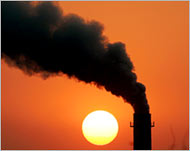Britain urges global pollution curbs
Britain has called for a broad international agreement to curb pollution amid signs that natural disasters may be linked to global warming.

Energy ministers from 20 countries in London on Tuesday discussed how to tackle climate change through technology and persuade big polluters – the United States, India and China – to become involved in the fight.
“Today’s dialogue has succeeded in reinforcing the need for international partnerships and cooperation in tackling the reality of climate change,” Margaret Beckett, Britain’s environment, food and rural affairs secretary, said in a statement.
British Prime Minister Tony Blair said that when the landmark Kyoto Protocol expires in 2012, the international community would need a more sensitive framework for tackling global warming. Setting targets, he added, made countries worry about their economies.
“People fear some external force is going to impose some internal target on you, which is going to restrict your economic growth,” Blair told environment and energy ministers from 19 countries on Tuesday.
 |
|
The Kyoto Protocol went into |
“I think in the world after 2012 we need to find a better, more sensitive set of mechanisms to deal with this problem.”
A final joint communique said the ministers had agreed to work towards using cleaner energy, such as technology to capture and store carbon emissions from coal-fired power stations.
They said they would try to find ways to encourage the private sector to invest in low-carbon technology with the help of the World Bank.
Mexico will be host to the next round of talks in 2006, Beckett said.
Greeenhouse gas
Many scientists blame the rapid increase in greenhouse gas emissions, especially carbon dioxide, in the past century for causing global warming whose worst effects could include rising sea levels and flooding.
The United States, which did not sign the Kyoto Protocol on climate change, saw its Gulf Coast battered by a record number of hurricanes this year.
Britain wants a consensus on how to move beyond the Kyoto treaty, which does not cover developing countries such as India and China whose carbon dioxide emissions are soaring as their economies expand.
“It is clear that for China and India the priority is (economic) development,” Beckett earlier told a news briefing.
Tuesday’s summit brought the G8 group of industrialised nations alongside major developing countries, including India and China. It was the first meeting after an agreement at the July G8 summit, which stressed climate-friendly technologies.
After Kyoto
Tuesday’s meeting came ahead of a major United Nations climate change summit in Montreal set for later this month. At that summit, officials from 150 countries will discuss how to take Kyoto beyond 2012.
 |
|
Smog envelops the skyline of Los |
The International Energy Agency, the industrialised countries’ energy watchdog, has called for urgent measures to cut greenhouse gas emissions, 80% of which come from energy use.
World carbon dioxide emissions are forecast to soar 60% by 2030, mainly because of a rise in pollution from developing countries building hundreds of dirty coal-fired power stations to power fast-growing economies.
Growth in China and India will largely be powered by coal, cheap and readily available but a major source of carbon dioxide. New clean coal technology could cut emissions.
Trading pollution
The European Union this year launched a carbon dioxide emissions trading scheme under which companies have to reduce their pollution and can trade carbon credits in a new market.
The scheme, the world’s first international emissions market, is likely to be expanded to include aviation.
Britain will meet its Kyoto target on reducing CO2 pollution but is likely to miss more ambitious domestic goals.
The country’s carbon dioxide emissions have risen in recent years after falling sharply in the 1990s when gas-fired power stations were built to replace coal ones.